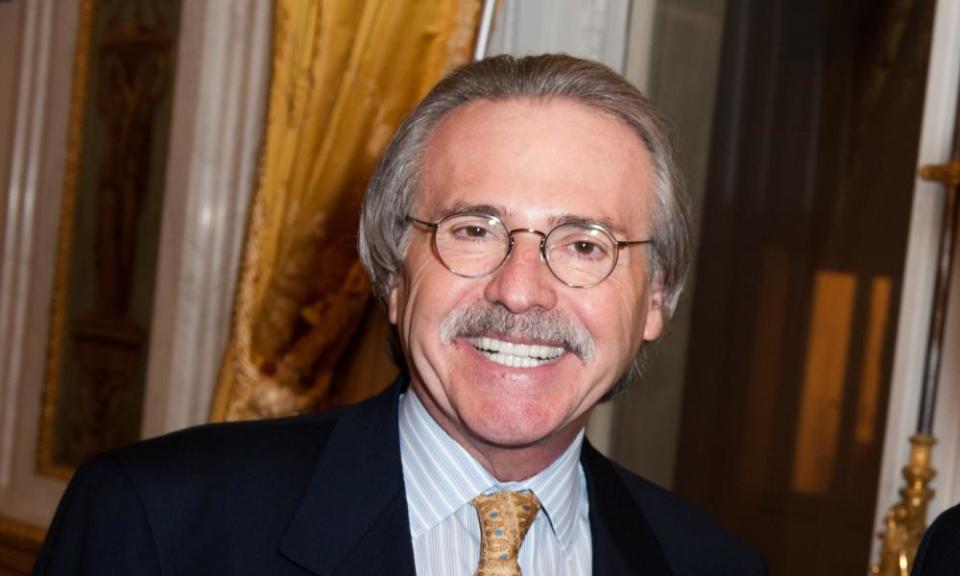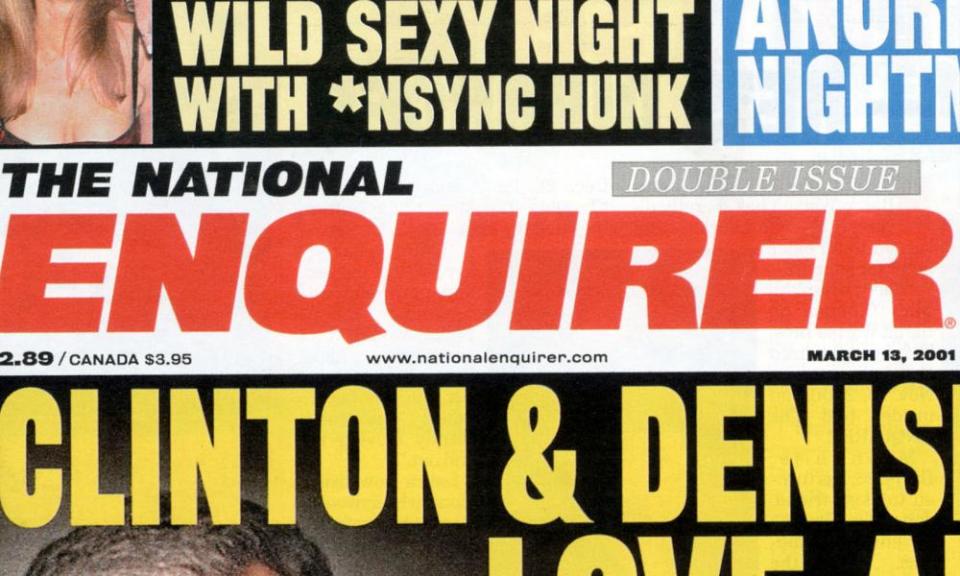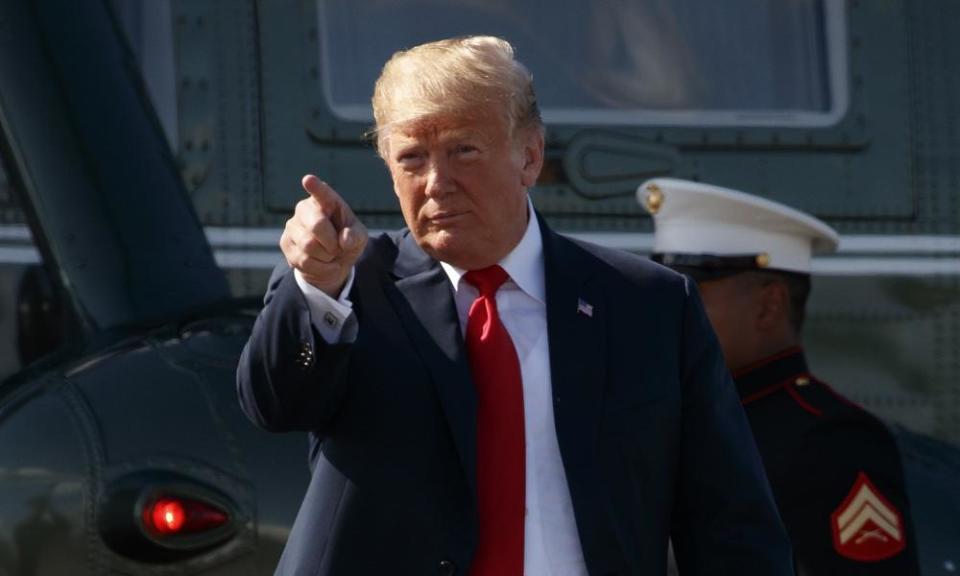David Pecker, the tabloid king: meet Trump's friend and fixer
The National Enquirer owner, whose name has emerged in Robert Mueller’s Russia inquiry, has had a symbiotic relationship with the president for decades

David Pecker’s reach into US society is unescapable: he owns nearly every supermarket tabloid and gossip sheet in the United States, including the flagship publication National Enquirer.
But before he surfaced as part of a federal investigation into the former Trump lawyer Michael Cohen, relatively little was known about Pecker, the longtime chief executive of American Media, Inc (AMI) and close Trump confidant.
He took centre stage two months ago when it was reported that he had been drawn into the special counsel Robert Mueller’s investigation into Russian meddling during the 2016 election.
And the media mogul appears in the tape recently released by Cohen’s attorney to CNN in which Trump’s former lawyer appears to be discussing how best to pay off Karen McDougal, a former Playboy model with whom Trump had had an affair. That, along with his recent subpoena in the criminal investigation of Cohen, have thrust him into the national spotlight. Pecker and the National Enquirer are under investigation for an alleged “catch and kill” in relation to the McDougal story – the practice of buying up a story and then burying it. Investigators are looking into whether this would constitute an unlawful contribution to the Trump campaign.
The Enquirer editor, Dylan Howard, says the tabloid’s approach to covering Trump is strictly business and that any stories it has killed were killed for innocent reasons.
“If AMI was ‘helpful’ to the president during the campaign it was because the audience of the National Enquirer was one of the most supportive of his candidacy,” Howard said in an April statement. “We covered him for a business reason.”
The Enquirer no longer holds the power, or has the reach, that it had during its heyday, when it reportedly sold 6m copies a week. It now sells fewer than 400,000.
Tabloids have been central to Trump’s myth-building since he emerged on the New York real estate scene. But none have been more helpful to his political ambitions than the Enquirer, which under Pecker has served to make Trump’s political attacks and storylines more digestible.
“The National Enquirer is even more valuable than a campaign mailer,” says the former Trump campaign adviser Sam Nunberg. “Why? Because whether people buy it or not, if they’re standing in a line, they’re standing in Walmart, they’re standing in a Costco, they’re waiting in line, they’re bored, they pull out the Enquirer and they look at it. And a lot of those people are primary voters, Republican voters, and election voters.”
AMI’s mission creep
Pecker’s ambitions for a tabloid empire have been apparent since he took over AMI almost 20 years ago – among his first moves as the new chairman was to ditch a group of prestigious publications to focus on growing ad money and media acquisitions.
And more recently Pecker, who, in addition to the Enquirer, owns Globe, OK!, Star, and Radar Online, all under the AMI umbrella, has found remarkable success in empire expansion.

In 2003, Pecker purchased Wieder Publications, publisher of Men’s Fitness and Shape, for $350m. In 2017, he extended AMI’s celebrity news portfolio further with the purchase of Us Weekly, a jewel in the celebrity gossip crown. Then in June, Pecker went from being the country’s biggest tabloid publisher to controlling nearly all the grocery checkout rack with the acquisition of 13 new titles from Bauer Media, including In Touch, Life & Style, and several teen magazines.
It’s a bold move for Pecker, given that his company’s facing the most intense legal and public scrutiny in its history – and it’s not just the Enquirer’s Trump coverage raising eyebrows.
After allegations brought by the actors Rose McGowan and Ashley Judd sparked journalistic investigations into the sexual conduct of the Hollywood mogul Harvey Weinstein, the Enquirer’s editor began gathering information to undercut female accusers on Weinstein’s behalf, according to 2017 reports from the New Yorker and New York Times. (Howard has acknowledged gathering information for Weinstein, but he says he only did it when the producer “was denying any harassment”.)
Now Federal Election Commission officials will determine if AMI violated campaign finance laws during the 2016 presidential campaign. At issue is AMI’s purchase of the rights to the McDougal’s Trump affair story, part of a $150,000 deal signing her on as a contributor, but neither the story, nor any of McDougal’s commentary, ever materialized.
The McDougal arrangement is also being examined in a separate investigation out of the southern district of New York. Federal investigators have asked for all communications between Cohen and Pecker and Howard, part of a larger criminal investigation of Cohen. AMI has denied any wrongdoing and Trump has denied any knowledge of payment to McDougal.
Pecker’s love affair with Trump
David Pecker was born the son of a bricklayer in the Bronx and, upon graduating from Pace University, he worked as an accountant at Price Waterhouse.
In 1979, he landed a position in accounting with CBS’s magazine division, and though he chafed against the bureaucracy of the place, he moved deftly up the ranks. When the magazine division was sold to the entrepreneur Peter Diamandis, who eventually sold the portfolio to Hachette Filipacchi, Pecker went with him, and in 1990, Pecker was named president of Hachette.
Later, as head of AMI, he was known for his awareness of how well different celebrities fared in telephone polls conducted by the Enquirer to test out potential covers. It’s an approach to news creation and consumption that’s in keeping with that of Trump, who’s has been described as “an aspirational figure” for Pecker in every way.
Both men keep second estates in Palm Beach, Florida, and their shared sensibilities go well beyond their mutual love of deal-making and obsession with celebrity. “I have never in my entire life seen a more beautiful woman in a bodysuit than Marla Maples,” a New Yorker piece recalls Pecker remarking of an early trip to Mar-a-Lago. “I mean, seriously, out of 10 she was a 15.”

When Pecker started up a new arm of Hachette, creating magazines with client-determined content and distribution, among his earliest glossies was Trump Style. The magazine would help Trump polish his gold-gilded aesthetic and throughout its five-year runtime, the embers of the Trump-Pecker relationship glowed bright. That relationship deepened when, at 47, Pecker became head of AMI.
For Pecker, Trump offered access to power. And for Trump, who came up through tabloid media, Pecker offered a continuation of his mythos. Pecker became a frequent guest at Mar-a-Lago and made use of Trump’s private planes.
He has also enjoyed the occasional affectionate tweetstorm from the president, as in 2013, when Trump tweeted repeatedly about how Pecker should be put in charge of Time magazine.
Trump has fostered many warm, fuzzy relationships with media heavyweights, including at Fox News and the Wall Street Journal. But none is quite so affectionate as the one with Pecker.
“Pecker would take care of Trump,” the former National Enquirer executive Stu Zakim said recently on CNN. “You have to understand the basis of the relationship that the two guys have.”
The 2016 presidential election and history’s sweep
That Trump got the sweeter end of the deal became clear by the time of the 2016 presidential campaign, when the Enquirer ran endless reams of sycophantic Trump coverage with headlines like “Don’t mess with Donald Trump” and “Top secret plan inside: how Trump will win debate!”
Meanwhile, the tabloid ran a questionable cover story on Ted Cruz’s supposed philandering, and even sought to link Cruz’s father to the assassination of John F Kennedy – a faux narrative Cruz is still salty about years later.
Timing was crucial: the Enquirer’s vocal promotion of conspiracy theories about Cruz’s father emerged just when Cruz became Trump’s only real competition left standing in the Republican primary.
These were the days when Cruz might have been able to set terms of a national debate. Instead it was Trump who set them, indirectly, with storylines in and beyond AMI.
Enquirer stories about Hillary Clinton, meanwhile, addressed her “failing health and a deadly thirst for power”.
And when he had the opportunity, Trump returned the publication’s favors in kind, sounding off about how the Enquirer ought to be “respected” and asking why it hadn’t won a Pulitzer prize for its 2007 reporting on John Edwards’ affair.
Nunberg, the former Trump campaign adviser, told the Guardian he was aware of Trump’s relationship with Pecker and spelled out the ways in which the Enquirer’s favorable coverage was a boon to the campaign.
”Look at the timeline of specific stories. A story was placed against Jeb Bush when we were worried about Jeb Bush,” Nunberg said. “When Marco Rubio was surging, the National Enquirer put out a story insinuating he was a gigolo in Miami. And then there was the Ted Cruz story that he had slept with five women outside his marriage. Look at their coverage of Hillary during the general about her health, her corruption. That is valuable. Everyone wants to use this term ‘get eyeballs, get eyeballs’. Forget eyeballs – it’s interesting. Not something you’ll fast-forward on your TiVo. You’re going to look at this. It’s a wacky story. It’s a tabloid. It’s valuable.”
He added, reflecting on the election: “You can talk to lots of people, they’d rather lose with dignity than win. I don’t believe that. We would take anything, any advantage we could get.”

